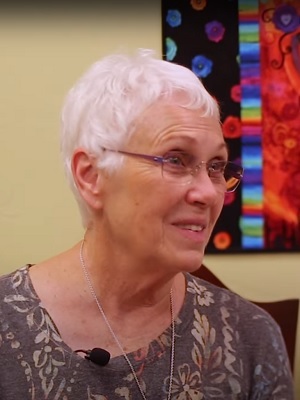
Volunteers at Sister José Women's Center in Tucson this past Wednesday, Nov. 17, getting ready to serve up 'hot oatmeal with all the fixins' for day program guests | facebook.com/srjosewomenscenter/
Jean Fedigan, founder and director of Sister José Women's Center in Tucson, has seen homeless women on their worst day. She calls that "a wonderful thing."
"The women on the street will sometimes come in when they're injured and say, 'Jean, I knew if we could get to Sister José's, you would help us'," Fedigan said in a Nov. 4 YouTube video. "What a wonderful thing, you know, and isn't that really living our faith."

Jean Fedigan, founder and director of Sister José Women's Center in Tucson
| youtube.com/watch?v=AKUDa1GrGSA
The Diocese of Tuscon shared the video on its Facebook page Nov. 8 with an invitation to the faithful to learn more about Fedigan and the center she directs. "SJWC meets the needs of homeless women in our community and ministers to these women with compassion," the post states.
"If you are insufficient with housing or clothing or food, you're not on a survival level," Fedigan says in the video. "And so you spend your days looking for survival. That's where we come in then, to provide those needs to help them meet their survival needs. That's not enough but it is our basic step.
"The most important thing we do here - and part of our mission vision and value - is that we welcome women, we treat everyone with respect and compassion, and because we need to build trust and they need to feel that they have a safe place to come. If you don't feel safe, you're not going to reach out for help."
Sister José's Women's Center was founded in 2009 by a group of women from Our Mother of Sorrows Parish to provide shelter and care for Tucson-area homeless women, according to the center's website. The center is named in honor of the Franciscan nun Sister José Hobday, who was dedicated to helping the less fortunate. Sister Jose was a nationally known lecturer, author and storyteller who drew "from her own experience growing up as a Native American Catholic in the American Southwest, eloquently communicate her relationship with and commitment to God, family and community," the website states.
Hobday "really worked her entire life to meet the needs of the poor," Fedigan said. "She was native American and her life was dedicated to the poor." Hobday died in 2009, the same year the center was founded.
Sister José's has since become ecumenical in makeup, welcoming women of many faiths as guests, and also as volunteers and staff who run and maintain the center. Sister José's offers respite for more than 2,000 women a month, according to information on the shelter's website and Facebook page. Sister José's day program offers an opportunity for women to come into the shelter, have a meal, have a shower, do laundry and receive food for the night; Sister José's night program provides up to 40 women a place to sleep each night.
"And we then help them begin to think about how to move forward," Fedigan said. "If it's respite and they just need a couple of nights and that's all they need, we're happy to give them that. If they are beginning to feel like they need to move forward, they need to try something different they don't know how, we come up with a plan with our case aids. And then we work with them to help them move forward."
The center also provides clothing and partners with area agencies to help match women with housing and health care.
Tuscon Pima Collaboration to End Homelessness, in a recent "point-in-time" count, reported approximately 600 people sleeping on streets or in cars and about 2,600 people sleeping in emergency shelters or supported housing. While data isn't available for the impact of the ongoing COVID pandemic on Tucson's homeless population, anecdotal evidence suggests that it isn't good.
"Just in the last two or three months, I am astonished by the number of new people who arrive," Fedigan said. "It's just amazing how many people are really are on the street, are going to the street."
Presently, the fastest-growing portion of the homeless population is women and women with children, Fedigan said.
Sister José's currently is the only shelter in town that allows pets, which is important for homeless women who often keep dogs with them for companionship and protection.
"The little dogs help protect them, so we always welcome the dogs," Fedigan said.
Many of the center's guests say they feel a presence at Sister José's.
"And that presence is love," Fedigan said. "Isn't that what our faith is about?"
Sister José's is located at 1050 S. Park Ave. in Tucson. A capital campaign is underway to move Sister José's to a larger facility and the center hopes to raise $5,000 on "Giving Tuesday" Nov. 30.






 Alerts Sign-up
Alerts Sign-up